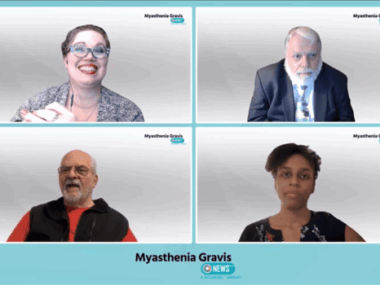How expressing gratitude improves my life with chronic illness
The practice benefits my health year-round, not just at Thanksgiving
Written by |

Recently I noticed that expressing gratitude results in a change in my body. It’s hard to put into words, but I feel warm and peaceful. Something is different — better.
I decided to investigate this phenomenon. I wanted to know if the symptoms of myasthenia gravis (MG) are lessened when one practices gratitude. What I learned will resonate with many in the rare disease community. Let me explain.
I grew up in the Boston area, where, from my earliest years, I learned that November is a special month. It begins with All Saints Day, which, according to the Catholic Answers website, “provides an opportunity to honor those who have gone before us, to reflect on our own spiritual journey, and to pray for those who have passed away.” The month ends with Thanksgiving, when we remember all of our blessings and express our gratitude.
Over the years, I’ve developed a little routine. Each November I choose two reasons from the past year to express gratitude. I reflect on them, share them with others, and celebrate them. Thank you, pilgrims, Puritans, and Catholics.
Reasons to give thanks
This Thanksgiving I am grateful to be home after a seven-week absence. Long planned renovations required placing all of my belongings in storage, living out of a suitcase, and then moving everything back in. The latter took place nine days ago, and I hope to finish unpacking tomorrow.
It’s been a long haul, but my place looks fantastic. I’m surrounded by my own things and the rhythm of my life has returned. I couldn’t be more grateful.
Thanks to the genius and dedication of researchers, nurses, doctors, and a plethora of others, my life with MG is dramatically easier than my dad’s, who lived with the condition for the last 13 years of his life. That was a time when treatment for MG was limited. Ultomiris (ravulizumab-cwvz) and Vyvgart (efgartigimod alfa-fcab), which have dramatically improved my life, were still in development.
I will always be grateful for the people who used their time and talent to develop these drugs. On Thanksgiving Day, I’ll tell family and friends about the immense gratitude I feel for the medications I use and for the fact that I am blessed with a roof over my head. I am thankful to live in a safe, wonderful, warm, and clean home.
The benefits of practicing gratitude
It turns out that expressing gratitude may improve my quality of life, as the practice can significantly benefit both physical and psychological health.
As a Mayo Clinic Health System article notes, “Studies have shown that feeling thankful can improve sleep, mood and immunity. Gratitude can decrease depression, anxiety, difficulties with chronic pain and risk of disease.”
When I regularly set aside time to practice gratitude, I feel less stress, I sleep better, and my emotional state improves.
The motivational speaker and author William Arthur Ward is believed to have said, “Feeling gratitude and not expressing it is like wrapping a gift and not giving it.”
This Thanksgiving, make a point of telling someone important to you how grateful you feel for them. After the holiday, devise a way to incorporate gratitude into your daily life. I know the effects will be positive.
As the Dutch priest and professor Henri Nouwen wrote, “The discipline of gratitude is the explicit effort to acknowledge that all I am and have is given to me as a gift of love, a gift to be celebrated with joy.”
Happy Thanksgiving! Have an extra helping of gratitude.
Note: Myasthenia Gravis News is strictly a news and information website about the disease. It does not provide medical advice, diagnosis, or treatment. This content is not intended to be a substitute for professional medical advice, diagnosis, or treatment. Always seek the advice of your physician or other qualified health provider with any questions you may have regarding a medical condition. Never disregard professional medical advice or delay in seeking it because of something you have read on this website. The opinions expressed in this column are not those of Myasthenia Gravis News or its parent company, Bionews, and are intended to spark discussion about issues pertaining to myasthenia gravis.




Leave a comment
Fill in the required fields to post. Your email address will not be published.